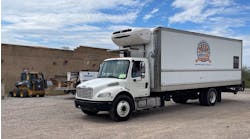Reefer gladness: Temperature-controlled fleets flock to Utah
PARK CITY, Utah—Refrigerated fleets are facing a mountain of operational challenges, from falling rates and rising equipment costs, to the unrealistic zero-emissions timelines and equipment regulations policymakers are pushing.
Fortunately, reefer fleets aren’t confronting those challenges on their own.
After a sparsely attended post-Covid gathering in 2021, the Truckload Carriers Association’s annual Refrigerated Meeting boasted a solid showing for the second straight year last week, with 248 attendees representing 40 temperature-controlled carriers and numerous industry suppliers descending on the picturesque peaks of Park City, Utah.
The reefer meeting also welcomed 250 attendees last year after only drawing 141 in 2021.
“Our allied members, or suppliers, probably haven’t felt it as much as the carriers have, yet,” Dave Williams, TCA chairman and senior vice president of equipment and government relations at Knight-Swift Transportation, told the crowd July 21 on the final day of the three-day meeting at the Grand Summit Hotel. “We may be heading into a slower time for our suppliers, but for our carriers, it’s been a rough go. It’s been tough. We’re seeing rates fall like a rock off a cliff, we’re seeing costs rocket up like nobody’s business—and it’s been a battle.
“But this is the place to be in order to understand what you need to do for your business and survive these kinds of times.”
Reefer gladness
The 2023 meeting featured an optimistic economic outlook from Donald Broughton, principal and managing partner at Broughton Capital; a lesson on overcoming adversity from keynote Chad Williams, a former Navy Seal and author of “Seal of God;” reefer roundtables; multiple informative sessions and educational workshops—several of which Refrigerated Transporter will break down in the coming weeks—and plenty of networking opportunities, including a golf outing and trip to Utah Olympic Park, home of the 2002 Olympic Winter Games.
(Start the slideshow for scenes from TCA’s 2023 Refrigerated Meeting in Park City.)
Trevor Kurtz, general manager at Brian Kurtz Trucking, also presented the refrigerated division’s leadership team for 2023-24. The team includes incoming chairman Amber Edmondson, president and CEO of Trailiner; vice chair Ed Nagle, president and CEO of Nagle Companies; and immediate past chair Mike Durst, chief operating officer at Arctic Express; and officers Matt Gadberry (Magnum president), Ken Johnson (Leonard’s Express CEO), Pam Wiers (Dutch Maid controller), Lucas Subler (Classic Carriers president), Ashley Kordish (Ralph Moyle CEO), and Kurtz.
“We appreciate all the past chairs who pitched in to help us, and the group that did the planning over the past couple of years to build this meeting back up, and we are going to continue to do that, to make it the best use of your time while you’re here,” Edmondson said in her first address as the new reefer chair before presenting a commemorative plaque to Durst. “I specifically want to thank the TCA staff for everything they’ve done to make this a great event—and Chairman Durst for everything he’s done.”
Association initiatives
Williams then outlined five pressing TCA priorities—which include driver advocacy, highway safety, motor carrier financial sustainability, environmental concerns, and industry promotion—for attendees, who included 84 first-timers. Driver advocacy includes pushing for more truck parking, and improving highway safety hinges on new benchmarking efforts, and combating “bad ideas” like side underride guards.
See also: Side underride notice triggers cost-benefit debate
“I had a visit from some of my friends here, a trailer manufacturer based in Salt Lake … [and] they showed me what this would look like and how much it would weigh, and I was flabbergasted,” Williams said. “And then you look at NHTSA, who just put out a study, and their own study said the net benefit of side underride guards is negative $1 billion. But there are a few lawmakers who intend to try to make this happen, and it doesn’t make sense.
“We can take that same money and put it into active braking, or we could put it into other areas of safety that are going to yield a substantial amount of savings and benefits side underride guards would never touch.”
TCA is pursuing better tax policies, like the elimination of the Federal Excise Tax (FET), and assisting carriers with the TCA Profitability Program (TPP); and pushing back on unrealistic zero-emission commercial vehicle timelines as part of its collaborative work with the six-association Clean Freight Coalition, which no longer includes the Engine Manufacturers Association (EMA) after EMA broke away from the newly formed group to establish the Clean Truck Partnership with the California Air Resources Board (CARB) earlier this month.
‘Troublesome’ development
Williams pointed out positive elements of the agreement, which he said allows carriers to buy trucks that actually can operate in California next year and “harmonizes” the NOx rule, but also highlighted two “shady” aspects he finds “troublesome.”
See also: Trucking groups call for support of FET repeal bill—again
“One was that the OEMs agree to limit their advocacy against the rule and against CARB,” he emphasized. “So, what they’re saying is, ‘You need to be quiet.’ Well, it’s a problem for a government agency to say, ‘You can’t speak.’ This is the United States of America. This is the land of the free and the home of the brave. We should be able to speak whenever we feel like we need to. The other provision was that they have to comply with the California rule, regardless of the outcome of any litigation against the rule.
“So, effectively what’s happened here is if the rule is found to be illegal, unconstitutional, or unenforceable, California is saying, ‘We don’t care. If you’re going to agree to this, you’re going to have to comply with the rule, even if we lose in court.’
“That’s a problem. That’s a big problem.”



